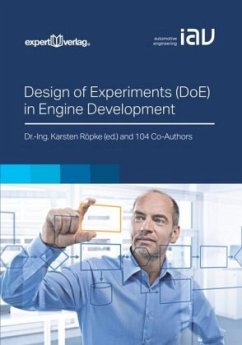The method Design of Experiments is well-established in today's engine development process. This thesis is confirmed in the conference proceedings at hand, where experts of international automotive manufacturers and supply industry as well as various research institutes and universities present their current results and experiences concerning the topic.
In developing new methods, it is important to realize that - just as with technical innovations - the road from verifying functionality to efficient use in a production project is a long one. This calls for user-friendly tools and convincing launch strategies.
Contents:
Bayesian D-Optimal Design
- Analytic Model Based Design of Experiments
- Strategies for Improving the Process of Test Design and Test Plan Computation for High Dimensional Designs
- Rapid Boundary Detection for Model Based Diesel Engine Calibration
- Automation of Model-Based Calibration in Engine Development
- DoEs on Automated Single Cylinder GDI Engine: Towards Deeper and Quicker Characterization of New Combustion Systems
- Practical Approach to Thermo-Dynamic Modelling of Diesel Engine Emissions
- Extension of the Classical DoE Method to Dynamic Conditions by means of Characteristic Numbers
- Method for Dynamic Online Identification with Integrated Determination of Operating Boundaries
- The Application of DoE in Engine Design
- Application of DoE in Spray Guided DI Gasoline Engines
- Direct and Indirect Methods for DoE of Automotive Systems
- Cluster Analysis Using an Extended k-Means Process
- Derivative Free Optimization Method and Physical Simulations Coupled with Statistical Models for Transient Engine Calibration
- Implementation of Statistical Models in an ECU
- The Challenges of an Empirical Model Based Transient Calibration Process
- Target Oriented Driveability Calibration through Standardized Processes and Tailored Tool Support
- Intelligent Calibration Tool: A Use Case
- Test Bench Suitable Determination of Psychoacoustic Parameters Characterizing Diesel Engine Sounds
- Comparison of Identification Methods for Nonlinear Dynamic Systems
- The Echo State Approach on Nonlinear System Modelling
- Comparison of Alternative Approaches to Auto-Regressive Modelling of Dynamic Systems
- Advanced Approaches for the Identification of Dynamic Engine Behavior with Probabilistic Modeling
- Dynamic Engine Modelling Using Local Model Networks
- Global Dynamic Modeling: A consistent Approach for both Diesel and Gasoline Engines
- Runge-Kutta Neural Networks for Identification of Dynamic Black-Box Models on the Testbed
- Evaluation of Gaussian Processes for Black-Box Engine Modelling
- Automated Parameterization of Conventional 1D Cycle Simulation Tools with Advanced Parametric and Experimental Uncertainty Propagation
- New Challenges in Optimization for Model-Based Calibration
- Evaluating Efficiency Modifications and Finding Optimal Solutions in Automotive Conceptual Design
In developing new methods, it is important to realize that - just as with technical innovations - the road from verifying functionality to efficient use in a production project is a long one. This calls for user-friendly tools and convincing launch strategies.
Contents:
Bayesian D-Optimal Design
- Analytic Model Based Design of Experiments
- Strategies for Improving the Process of Test Design and Test Plan Computation for High Dimensional Designs
- Rapid Boundary Detection for Model Based Diesel Engine Calibration
- Automation of Model-Based Calibration in Engine Development
- DoEs on Automated Single Cylinder GDI Engine: Towards Deeper and Quicker Characterization of New Combustion Systems
- Practical Approach to Thermo-Dynamic Modelling of Diesel Engine Emissions
- Extension of the Classical DoE Method to Dynamic Conditions by means of Characteristic Numbers
- Method for Dynamic Online Identification with Integrated Determination of Operating Boundaries
- The Application of DoE in Engine Design
- Application of DoE in Spray Guided DI Gasoline Engines
- Direct and Indirect Methods for DoE of Automotive Systems
- Cluster Analysis Using an Extended k-Means Process
- Derivative Free Optimization Method and Physical Simulations Coupled with Statistical Models for Transient Engine Calibration
- Implementation of Statistical Models in an ECU
- The Challenges of an Empirical Model Based Transient Calibration Process
- Target Oriented Driveability Calibration through Standardized Processes and Tailored Tool Support
- Intelligent Calibration Tool: A Use Case
- Test Bench Suitable Determination of Psychoacoustic Parameters Characterizing Diesel Engine Sounds
- Comparison of Identification Methods for Nonlinear Dynamic Systems
- The Echo State Approach on Nonlinear System Modelling
- Comparison of Alternative Approaches to Auto-Regressive Modelling of Dynamic Systems
- Advanced Approaches for the Identification of Dynamic Engine Behavior with Probabilistic Modeling
- Dynamic Engine Modelling Using Local Model Networks
- Global Dynamic Modeling: A consistent Approach for both Diesel and Gasoline Engines
- Runge-Kutta Neural Networks for Identification of Dynamic Black-Box Models on the Testbed
- Evaluation of Gaussian Processes for Black-Box Engine Modelling
- Automated Parameterization of Conventional 1D Cycle Simulation Tools with Advanced Parametric and Experimental Uncertainty Propagation
- New Challenges in Optimization for Model-Based Calibration
- Evaluating Efficiency Modifications and Finding Optimal Solutions in Automotive Conceptual Design

